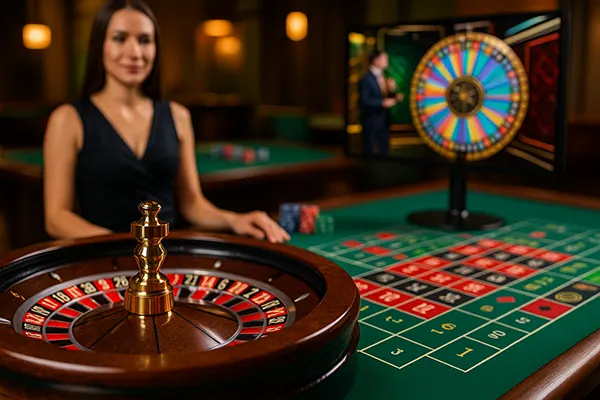
Probabilidades dinámicas en los juegos de casino en vivo: cómo cambian las posibilidades de ganar en tiempo real
Los juegos de casino en vivo han revolucionado la forma en que los jugadores interactúan con los formatos de juego clásicos al brindar un nivel de interactividad y realismo sin precedentes. Con transmisión en tiempo real y crupieres humanos, estos juegos desdibujan la línea entre los casinos digitales y físicos. Sin embargo, las probabilidades dinámicas que sustentan los juegos en vivo siguen siendo uno de los aspectos menos comprendidos. ¿Cómo funcionan? ¿Qué los hace cambiar a mitad de camino? Exploremos cómo las variables en tiempo real afectan las posibilidades de ganar en los juegos de casino en vivo.
Comprensión de las probabilidades dinámicas en entornos en vivo
Las probabilidades dinámicas, a menudo llamadas probabilidades flotantes o en vivo, se ajustan en tiempo real en función de múltiples variables del juego. A diferencia de las probabilidades fijas que se encuentran comúnmente en los juegos digitales automatizados, las probabilidades dinámicas cambian según el flujo del juego, las decisiones de los jugadores y, a veces, incluso las entradas de datos externos. Este sistema refleja el comportamiento del mercado financiero, creando un entorno de juego ágil y responsivo.
Estos cambios son especialmente notables en los formatos de juegos en vivo como la ruleta, el blackjack y los programas de juegos. Por ejemplo, en la ruleta en vivo, algunos operadores ofrecen «apuestas paralelas» o «probabilidades especiales» justo antes de que caiga la bola. Estos se recalculan en función de las apuestas actuales y los niveles de riesgo de la casa. De manera similar, en el blackjack, los métodos de conteo de cartas o los resultados históricos pueden influir en cómo se percibe el comportamiento del crupier, alterando sutilmente las oportunidades percibidas incluso si las probabilidades principales permanecen estadísticamente estáticas.
Las cuotas dinámicas se calculan utilizando algoritmos sofisticados que procesan el comportamiento del jugador, la distribución de las apuestas y el momento. Algunos sistemas también tienen en cuenta los factores desencadenantes de la volatilidad, como rachas de victorias o patrones de apuestas, para ajustar los multiplicadores de pagos en tiempo real. Esta complejidad garantiza que cada ronda siga siendo impredecible, justa y atractiva.
Impact on Player Strategy and Expectations
Understanding how dynamic odds function allows experienced players to adjust their strategies. In games like Lightning Roulette or Monopoly Live, where multipliers and bonus features are common, timing a bet becomes just as critical as placing it. Players aiming for high-payout scenarios often wait for signal moments when odds swing favourably.
For newcomers, this can be confusing. They may notice different payout ratios for the same bet at different times and mistake it for inconsistency. In reality, it’s a core feature of the game design, meant to reward situational awareness and adaptive betting. This trend moves live casino experiences closer to sports betting dynamics, where timing, statistics, and odds shifts are integral parts of the process.
Casinos also use these systems to manage risk. Dynamic odds help balance the operator’s exposure by encouraging bets on less popular outcomes or limiting those on high-risk options. This benefits both players and casinos by maintaining long-term sustainability and fairness.
Examples of Live Games with Dynamic Odds
Some of the most popular live titles that showcase dynamic odds include Lightning Roulette, Crazy Time, and Deal or No Deal Live. These games often use multipliers, bonus rounds, or live decision-making elements that affect final payouts.
In Lightning Roulette, random numbers are struck with multipliers between 50x and 500x. Since these numbers are chosen live, odds change based on which numbers are boosted. Players may adjust their bet spread accordingly. The house edge stays consistent, but the volatility rises significantly due to the potential for high returns.
Crazy Time introduces several layers of randomness and player agency. The presence of multiple bonus rounds (Cash Hunt, Pachinko, Coin Flip, and Crazy Time) creates varied odds pathways in every game session. Players can choose which rounds to participate in, dynamically influencing their risk-reward profile depending on the bonus activated.
Technical Infrastructure and Algorithms
The entire system of dynamic odds relies on a mix of advanced technology and human oversight. Algorithms process massive volumes of data in milliseconds — including current bets, past results, and server-wide trends — to recalibrate odds instantly. These systems must also comply with strict regulatory requirements ensuring transparency and fairness.
Live dealers, while key to the immersive experience, don’t directly influence odds. However, their interaction with the game environment is factored into the system. Every card drawn, ball spun, or dice rolled is tracked and recorded, feeding back into the algorithm to inform future probability adjustments.
Random Number Generators (RNGs) may still be used in certain hybrid games to ensure unpredictability, especially in bonus rounds or multiplier selections. These RNG outcomes are then cross-referenced with live events to finalise odds in real time. This blend of human touch and algorithmic rigour makes live games both secure and thrilling.

Risks and Responsible Gaming Considerations
Dynamic odds can heighten excitement, but they also carry risks. The illusion of control and constantly shifting potential rewards may lead to impulsive decisions. It’s crucial for players to set clear betting limits and understand that no system can guarantee wins, even when odds appear favourable.
Operators are increasingly integrating responsible gaming tools into live interfaces. These include real-time bet tracking, pause/play reminders, and self-exclusion features. For games with dynamic odds, such features are essential to prevent escalation and financial harm during extended play sessions.
Transparency remains a cornerstone of trust in these games. Regulators often require operators to disclose how odds are determined and what elements influence them. Players should always review the game’s rules and payout structures before participating, especially when odds fluctuate during play.
Future Outlook for Dynamic Odds in Live Games
Looking ahead, we can expect even more advanced dynamic systems in live games. Integration with AI could further personalise odds based on individual player profiles and habits — though this raises questions about fairness and consent. Data protection and ethical gambling will become increasingly important.
Cross-game ecosystems may also emerge, where odds in one live game affect others in real time. For instance, a win in one round of Dream Catcher could impact bonuses or odds in a linked game like Crazy Time. Such innovations will deepen engagement but require robust oversight.
In conclusion, dynamic odds have transformed live casino games from static betting formats into interactive, real-time experiences. While they offer new layers of strategy and excitement, they also demand greater understanding and discipline from players. Informed, cautious participation is the key to making the most of this evolving gaming landscape.



